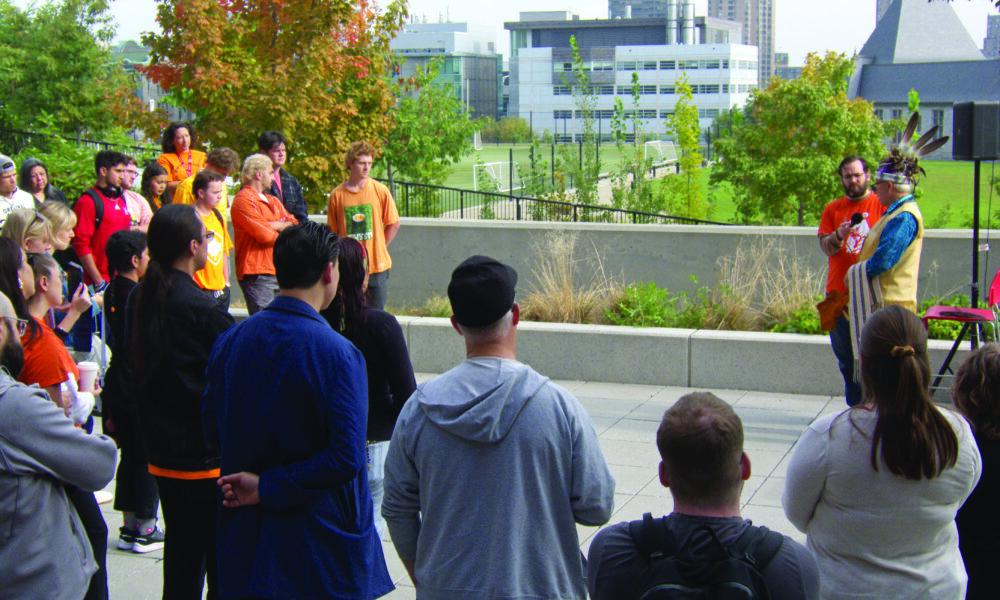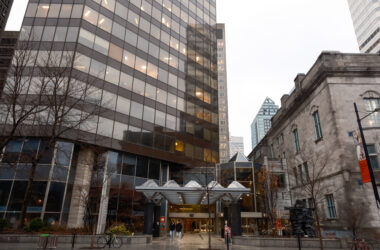On Sept. 29, McGill’s Faculty of Education held its fifth annual event for the National Day for Truth and Reconciliation, also known as Orange Shirt Day: Skátne Entewathahíta – We Will Walk Together.
The event, which is an initiative led by Indigenous students and faculty members, began with an introduction from Dennis C. Wendt, an Associate Professor in the Department of Educational and Counselling Psychology and the faculty coordinator for the event. Wendt opened with a land acknowledgement before explaining the theme of this year’s event: “Pathways from Awareness to Action: What Is Our Role?”
Following Wendt’s introduction, Elder Ka’nahsohon Kevin Deer—who is Kanien’kehá:ka and is a member of the Kahnawake First Nation, a faithkeeper at the Mohawk Trail Longhouse, and a prominent knowledge holder—began his opening remarks. Elder Deer discussed a number of teachings, warned listeners against the continued use of fossil fuels, centred the importance of listening to Indigenous teachings in relation to the land, shared his own experience with residential schools, and concluded on a message of hope for the future of the climate.
Celeste Pedri-Spade, the university’s first Associate Provost for Indigenous Initiatives and an associate professor of anthropology, was next to speak. Pedri-Spade discussed what Orange Shirt Day means to her as a mother, an Anishinaabekwe, and an intergenerational survivor of residential schools.
“My kids are 10 years old now [….] Wherever they go they should see themselves reflected back,” Pedri-Spade said. “That’s not a reality for them yet [….] The plan [the 52 Calls to Action], has those actions that will work toward that because every child matters and every child should have that ability to achieve their educational goals at a place like McGill.”
Victoria Talwar, the Interim Dean of the Faculty of Education, then discussed the important role of educators in truth and reconciliation before attendees were given the option to participate in one of two events.
The first option was an interactive presentation about the “Walking Alongside” teacher education website. The site was developed following the first three years of the Faculty of Education’s Skátne Entewathahíta – We Will Walk Together event with the hope of incorporating the 52 Calls to Action into the Quebec curriculum.
“If our society wants to move forward and really get towards reconciliation, it starts within our schools,” Margaret Mackenzie, who is a citizen of Métis Nation in British Columbia, B.Ed ‘23, and the Indigenous outreach coordinator of Branches, told The Tribune. “It’s so important to have children understand the impacts of residential schools, and ongoing colonial violence that’s happening today. For educators to be aware of this and to educate themselves before educating others is really important.”
The second option was to go on the Critical Campus Tour developed by staff and Indigenous students in affiliation with the More Than Words project in the Participatory Cultures Lab this past spring. Tour participants were broken up into small groups then led around campus to the James McGill Monument by the Arts Building, the 13th century Haudenosaunee Village at the corner of Sherbrooke and Peel, and the Hochelaga Rock at the Roddick Gates to discuss the area’s colonial and Indigenous history.
Rachel Mackenzie, U3 Arts, who is a citizen of Métis Nation in British Columbia, emphasized the importance of thinking critically about the McGill name and the implications of its use during the tour.
“It’s really interesting to think about what comes to mind when people hear McGill,” Mackenzie concluded. “Is it this academic institution? Or do you think about James McGill? […] Do you think about his history? [….] We’ve seen changes in academic institutions with Toronto Metropolitan University and we’ve seen the positive impact that a name change can have on a community.” The event also provided pamphlets with a how-to guide on creating your own critical campus tour and a QR code for an expanded version of the tour.









